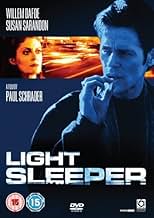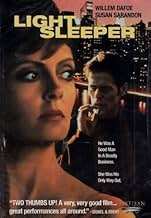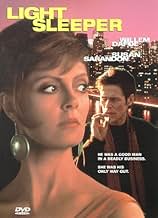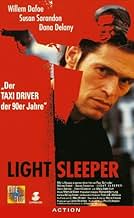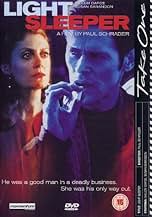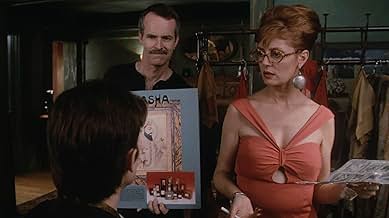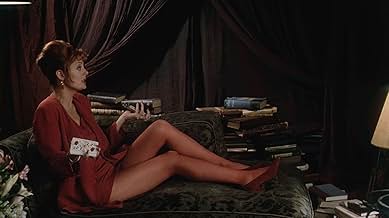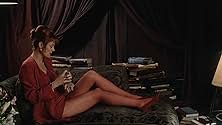IMDb रेटिंग
6.9/10
11 हज़ार
आपकी रेटिंग
एक ड्रग डीलर अपने प्रोफेशन को बदलने के लिए फिर से सोचता है, जब उसका बॉस अपराध का रास्ता छोड़ने की बात करता है और तभी अतीत में से कुछ निकल कर सामने आता है.एक ड्रग डीलर अपने प्रोफेशन को बदलने के लिए फिर से सोचता है, जब उसका बॉस अपराध का रास्ता छोड़ने की बात करता है और तभी अतीत में से कुछ निकल कर सामने आता है.एक ड्रग डीलर अपने प्रोफेशन को बदलने के लिए फिर से सोचता है, जब उसका बॉस अपराध का रास्ता छोड़ने की बात करता है और तभी अतीत में से कुछ निकल कर सामने आता है.
- पुरस्कार
- 1 जीत और कुल 6 नामांकन
Rene Raymond Rivera
- Manuel
- (as a different name)
Vince Cupone
- Young Cuban
- (as Vinny Capone)
Chris Northup
- Retro Yuppie
- (as Christopher Todd Northup)
फ़ीचर्ड समीक्षाएं
Paul Schrader's love/hate relationship with close to down-and-out male individuals living in New York City continues in 1992's Light Sleeper. Schrader casts a dim eye on most of the proceedings in the place, but his revisiting of New York City in Light Sleeper, and whatever knowledge past you have of 1976's Taxi Driver, shows a clear fondness for the place; a fondness to keep going back and exploring new characters, operating under new situations and working with new problems floating around inside of their heads. In Light Sleeper's case, it is Willem Dafoe's John LeTour, a middle aged man whom deals drugs; meets some pretty desperate individuals in the process; cannot connect that well with the women he wants most; is stalked by police men and generally tries to balance his on-going loneliness with his inability to really find his place in life.
Light Sleeper is a wonderfully down to Earth and thoroughly intense film. With hindsight, one might think of it as a Trainspotting without all the hyper-kinetic energy. The film begins, quite literally, with a focusing on a road as we flow through New York; this is before developing into a ground level documentation of life flitting between streets, apartments that inhabit drug users and dealers, grotty nightclubs that house further users plus hotel suites which spell danger. The easy way to summarise the male lead we're given in Light Sleeper would be a comparison to Taxi Driver's Travis Bickle, as penned by Schrader. LeTour is a loner; he keeps a diary, although possesses better handwriting skills; attempts to talk and follow women he simply cannot have; and generally wanders. There is even room for the characters to pay reference to the rain at certain times, and its importance. Like Taxi Driver; the film is a gathering, only not of an individual's visions of what's around him, but of the interactions and of the people that exist around him.
This idea is best explored in a scene set in a hospital. LeTour is visiting the mother of a certain Marianne Jost (Delany), as another relative, whilst in the intensive care room, sits asleep in a chair. LeTour walks in and sits down. The camera freezes on him sitting there, almost certain death in the air by way of the dying mother and the fact there are those he hands drugs out to whom will perish at some point in the near future. It's only after a while that he glances over at the relative, and it's only then that the camera will slowly track left to encompass, indeed recognise, she's even sitting there. It's an interesting touch by Schrader, and reminiscent of Taxi Driver by being a sort of polar opposite: we see, indeed recognise, what LeTour sees but only until HE does so first. We do not get it in that raw, unflinching and 1st person style the 1976 masterpiece delivers, but we do get it in some manner of speaking.
Light Sleeper knows what it is and knows exactly how it wants to unfold. The film isn't a conventional thriller, of sorts, about a drug dealer and a world of crime and the interactions that go on, even if it does end in a conventional manner by way of a bloody shootout. Rather, the film is a stark character study of a man on the way out; of a man wasting his life away through drugs, not as a junkie – something LeTour stresses to certain people he meets, but as a dealer and that any relation you might have to the stuff will most probably end you up in very bad shape. As a raw character study, we pick the lead up in his late thirties and cover him for about a fortnight. The damage has been done; we learn of his past troubles and whatever back-story we require by way of speech to other people, and we learn it all at regular, very well spaced intervals.
The film's attention to LeTour's element of unrequited love in his life is additionally well handled, somewhat seamlessly incorporated into the text by way of a series of nervous and unfortunate encounters. We first meet the aforementioned Marianne when LeTour's chauffeur driven saloon stops to pick her up out of the wet. By way of Dafoe's wonderful acting, LeTour is juddery and the professionalism driven image that we have of him up to this point, by way of short sharp encounters and knowing exactly what to say to different sorts of lowlifes, is shattered somewhat when he lies to her about continuing dealing drugs and screws up the whole interaction. The lyrics in the music and the manner in which the character regresses over a photo-album in the following scene could have been explored and executed in a far worse-a manner. The film's remaining scenes of obsession and rejection surrounding these two are well incorporated into the text.
I think Light Sleeper's crowning glory is its real attention to the finer things. There's a scene in which LeTour's consistently outrageously dressed female drug contact Ann, (Susan Sarandon, fresh off a wonderful role in Thelma and Louise) who is the the person that supplies all of the drugs to LeTour along with Robert (Clennon), from their pseudo-upper class decorated apartment, asks LeTour for a lunch meeting the following day. I got an odd sensation after the interaction had ended that a lesser film would cut straight to the lunch: person 'A' proposes something to person 'B'; person 'B' accepts and then we cut to the rendez-vous. Light Sleeper rejects the causality, opting for notions, interactions and ideas to rest on the back-burner whilst the lead carries on for a while interacting further with other people before the day is out. Make no mistake, there'll be no light napping during this picture.
Light Sleeper is a wonderfully down to Earth and thoroughly intense film. With hindsight, one might think of it as a Trainspotting without all the hyper-kinetic energy. The film begins, quite literally, with a focusing on a road as we flow through New York; this is before developing into a ground level documentation of life flitting between streets, apartments that inhabit drug users and dealers, grotty nightclubs that house further users plus hotel suites which spell danger. The easy way to summarise the male lead we're given in Light Sleeper would be a comparison to Taxi Driver's Travis Bickle, as penned by Schrader. LeTour is a loner; he keeps a diary, although possesses better handwriting skills; attempts to talk and follow women he simply cannot have; and generally wanders. There is even room for the characters to pay reference to the rain at certain times, and its importance. Like Taxi Driver; the film is a gathering, only not of an individual's visions of what's around him, but of the interactions and of the people that exist around him.
This idea is best explored in a scene set in a hospital. LeTour is visiting the mother of a certain Marianne Jost (Delany), as another relative, whilst in the intensive care room, sits asleep in a chair. LeTour walks in and sits down. The camera freezes on him sitting there, almost certain death in the air by way of the dying mother and the fact there are those he hands drugs out to whom will perish at some point in the near future. It's only after a while that he glances over at the relative, and it's only then that the camera will slowly track left to encompass, indeed recognise, she's even sitting there. It's an interesting touch by Schrader, and reminiscent of Taxi Driver by being a sort of polar opposite: we see, indeed recognise, what LeTour sees but only until HE does so first. We do not get it in that raw, unflinching and 1st person style the 1976 masterpiece delivers, but we do get it in some manner of speaking.
Light Sleeper knows what it is and knows exactly how it wants to unfold. The film isn't a conventional thriller, of sorts, about a drug dealer and a world of crime and the interactions that go on, even if it does end in a conventional manner by way of a bloody shootout. Rather, the film is a stark character study of a man on the way out; of a man wasting his life away through drugs, not as a junkie – something LeTour stresses to certain people he meets, but as a dealer and that any relation you might have to the stuff will most probably end you up in very bad shape. As a raw character study, we pick the lead up in his late thirties and cover him for about a fortnight. The damage has been done; we learn of his past troubles and whatever back-story we require by way of speech to other people, and we learn it all at regular, very well spaced intervals.
The film's attention to LeTour's element of unrequited love in his life is additionally well handled, somewhat seamlessly incorporated into the text by way of a series of nervous and unfortunate encounters. We first meet the aforementioned Marianne when LeTour's chauffeur driven saloon stops to pick her up out of the wet. By way of Dafoe's wonderful acting, LeTour is juddery and the professionalism driven image that we have of him up to this point, by way of short sharp encounters and knowing exactly what to say to different sorts of lowlifes, is shattered somewhat when he lies to her about continuing dealing drugs and screws up the whole interaction. The lyrics in the music and the manner in which the character regresses over a photo-album in the following scene could have been explored and executed in a far worse-a manner. The film's remaining scenes of obsession and rejection surrounding these two are well incorporated into the text.
I think Light Sleeper's crowning glory is its real attention to the finer things. There's a scene in which LeTour's consistently outrageously dressed female drug contact Ann, (Susan Sarandon, fresh off a wonderful role in Thelma and Louise) who is the the person that supplies all of the drugs to LeTour along with Robert (Clennon), from their pseudo-upper class decorated apartment, asks LeTour for a lunch meeting the following day. I got an odd sensation after the interaction had ended that a lesser film would cut straight to the lunch: person 'A' proposes something to person 'B'; person 'B' accepts and then we cut to the rendez-vous. Light Sleeper rejects the causality, opting for notions, interactions and ideas to rest on the back-burner whilst the lead carries on for a while interacting further with other people before the day is out. Make no mistake, there'll be no light napping during this picture.
Paul Schrader's finest film to date, and firmly lodged in my top 10, this is a surprisingly overlooked and underrated gem. Often touted as a "modern noir" movie, I really don't consider it in that genre at all.
The heart of the film is a reworking of the themes embodied in Schrader's earlier film "American Gigolo", where a man is forced to confront the fact that the life he is leading is fundamentally unsatisfying, reassess what he wants to do, find out who his real friends are and ultimately get redeemed through love.
Willem Dafoe's character Le Tour's journey is a slow but inevitable one, as his drug-dealing days are numbered due to his boss Susan Sarandon (also splendid) "going straight". Most of the scenes take place at night (hence the noir tag), but this is partly a consequence of the drug-dealing aspect and partly to capture the unreal mood of a man who doesn't know where he fits in to "normal" life. The device whereby Le Tour spends many hours writing his thoughts in an exercise book, throwing it away when he fills it, then starting another one, is so strong and startling that I put aside my usual dislike of narration. The soundtrack is also excellent and fits and expands the mood very well.
The best scene is probably the one in the hospital cafeteria, where Le Tour has a conversation with his ex-girlfriend that he hasn't seen for a long time - immaculately acted, tremendously understated with so many things going unsaid... The final scene, although Schrader nicked it from a French film, and used it before in "Gigolo", is still very powerful, based on the idea that whether a man is in prison or not is completely unrelated to whether he is free.
The heart of the film is a reworking of the themes embodied in Schrader's earlier film "American Gigolo", where a man is forced to confront the fact that the life he is leading is fundamentally unsatisfying, reassess what he wants to do, find out who his real friends are and ultimately get redeemed through love.
Willem Dafoe's character Le Tour's journey is a slow but inevitable one, as his drug-dealing days are numbered due to his boss Susan Sarandon (also splendid) "going straight". Most of the scenes take place at night (hence the noir tag), but this is partly a consequence of the drug-dealing aspect and partly to capture the unreal mood of a man who doesn't know where he fits in to "normal" life. The device whereby Le Tour spends many hours writing his thoughts in an exercise book, throwing it away when he fills it, then starting another one, is so strong and startling that I put aside my usual dislike of narration. The soundtrack is also excellent and fits and expands the mood very well.
The best scene is probably the one in the hospital cafeteria, where Le Tour has a conversation with his ex-girlfriend that he hasn't seen for a long time - immaculately acted, tremendously understated with so many things going unsaid... The final scene, although Schrader nicked it from a French film, and used it before in "Gigolo", is still very powerful, based on the idea that whether a man is in prison or not is completely unrelated to whether he is free.
Critics often rag on Paul Schrader for writing films about scumbags who find violence a shortcut to salvation. The conventional wisdom is that Schrader's scripts play better if Martin Scorsese directs them (Taxi Driver, Raging Bull) and that when Schrader directs Schrader, the result is a heavy, humorless mess. But that's not always true. In directing his own Hardcore and American Gigolo or scripts written in a darkly witty vein (Nicholas Kazan's Patty Hearst, Harold Pinter's Comfort of Strangers), Schrader can be slyly inventive. Crowd pleasing? No. Challenging? You bet.
It's difficult to imagine anyone but Schrader controlling the moral turbulence in his script for Light Sleeper, a boldly resonant thriller that elaborates on Schrader's favored themes of sin and redemption. John LeTour, a drug dealer played by Willem Dafoe, is a loner with direct connections to Taxi Driver's Travis Bickle and American Gigolo's Julian Kay. At forty, LeTour is in crisis. His boss, Ann (a fireball Susan Sarandon), is about to chuck drugs for cosmetics. LeTour is losing his coke customers to crack. And he is spooked by a psychic, strikingly played by Mary Beth Hurt. But in his diary (one of several tips of the hat to Robert Bresson's seminal Pickpocket), LeTour writes, "I can be a good person."
Maybe so, but transcendence doesn't come easy. New York's mean streets, given a noirish sheen by cinematographer Ed Lachman, tempt LeTour as he drives through the night making deliveries to the sleek and the sleazy. He is heartened by a chance meeting with Marianne (Dana Delany), an embittered former love and former addict who lets down her defenses for one night. (Warning: Hearing Delany announce, "I'm dripping," during a hot sex scene with Dafoe may be too much for China Beach fans.) As expected, violence erupts before things settle down. Schrader is out there again, testing the limits of audience tolerance. Good for him. Buoyed by his questing spirit and Dafoe's mesmerizing performance, Light Sleeper might just keep you up nights.
It's difficult to imagine anyone but Schrader controlling the moral turbulence in his script for Light Sleeper, a boldly resonant thriller that elaborates on Schrader's favored themes of sin and redemption. John LeTour, a drug dealer played by Willem Dafoe, is a loner with direct connections to Taxi Driver's Travis Bickle and American Gigolo's Julian Kay. At forty, LeTour is in crisis. His boss, Ann (a fireball Susan Sarandon), is about to chuck drugs for cosmetics. LeTour is losing his coke customers to crack. And he is spooked by a psychic, strikingly played by Mary Beth Hurt. But in his diary (one of several tips of the hat to Robert Bresson's seminal Pickpocket), LeTour writes, "I can be a good person."
Maybe so, but transcendence doesn't come easy. New York's mean streets, given a noirish sheen by cinematographer Ed Lachman, tempt LeTour as he drives through the night making deliveries to the sleek and the sleazy. He is heartened by a chance meeting with Marianne (Dana Delany), an embittered former love and former addict who lets down her defenses for one night. (Warning: Hearing Delany announce, "I'm dripping," during a hot sex scene with Dafoe may be too much for China Beach fans.) As expected, violence erupts before things settle down. Schrader is out there again, testing the limits of audience tolerance. Good for him. Buoyed by his questing spirit and Dafoe's mesmerizing performance, Light Sleeper might just keep you up nights.
Like "Prince Of The City", this is another great drug movie, with the greatest set ever built for a movie, New York City. Very few people saw "Prince", and I'll wager fewer saw this one. It has a cast of New York stage actors, who make the usual run of Hollywood anorexic barbie dolls, and Sunset Strip would be tough guys, look exactly like what they are, refugees from some "hysterical" wise cracking sit-com. I have to mention each one of these artists because they're so incredibly good. Willem Dafoe, Susan Sarandon, Dana Delany (what a performance), David Clennon, Mary Beth Hurt, Jane Adams(the looney sister from "Happiness"), David Spade, and last, but certainly not least Victor Garber. Paul Schrader wrote and directed, and if he never does another production, his mother can know that she gave birth to a major cinematic artist. The story can impress people as very hokey. Dafoe is a coke pusher. But he's very sensitive and loving, and is looking for a "better life". He's so guilt ridden as a pusher, he can hardly sleep. Oh, give me a break. But wait. With Dafoe I bought it completely. I was even rooting for him to get back with his former junkie lover Dana Delany. Delany and Susan Sarandon give major performances, Sarandon as a major supplier also looking to go straight as a cosmetic maven. This is a major manual on acting....look, learn, and enjoy.
With Schrader it always comes back to this. Lonely nights and aimless wandering, always just a step short of being swallowed up in the abyss. But it's always the worst at the brink, where guilt starts eating up inside.
So a jazz ballad about lonely nights, this is what people probably call noir in this. About a man who has come a long, painful way to get nowhere, is tired and looking for his harbor. He's a drug dealer, so we get the awkward encounters in seemy places and travel through other people on the same way down as he has been before.
Sarandon is radiant, fierce but fragile, but this is Dafoe's show, it wouldn't have been the same without Dafoe. He's right inside the character, where the desperation piles up. See how his face lights up when Sarandon invites him to lunch, how he passes through peoples' lives without staying, as though time is running out.
Two instances reveal the betrayal (one involving sex and a madonna painting), both involving mirrors that lie. The reflections reveal people who don't have time to get involved, how everyone's strange when you're a stranger. See if you can spot them out.
It is ultimately about the working out of karma, and how our present hells have been long in the digging. Eventually he has to atone with the one thing he's running out of and can't spare, time.
So a jazz ballad about lonely nights, this is what people probably call noir in this. About a man who has come a long, painful way to get nowhere, is tired and looking for his harbor. He's a drug dealer, so we get the awkward encounters in seemy places and travel through other people on the same way down as he has been before.
Sarandon is radiant, fierce but fragile, but this is Dafoe's show, it wouldn't have been the same without Dafoe. He's right inside the character, where the desperation piles up. See how his face lights up when Sarandon invites him to lunch, how he passes through peoples' lives without staying, as though time is running out.
Two instances reveal the betrayal (one involving sex and a madonna painting), both involving mirrors that lie. The reflections reveal people who don't have time to get involved, how everyone's strange when you're a stranger. See if you can spot them out.
It is ultimately about the working out of karma, and how our present hells have been long in the digging. Eventually he has to atone with the one thing he's running out of and can't spare, time.
क्या आपको पता है
- ट्रिवियाWriter/director Paul Schrader experienced a unique problem while filming was underway in New York City. The film is set during a sanitation worker strike which called for large amounts of uncollected trash to be prominently featured in exterior scenes. But since the real New York City sanitation department was very much on the job they would inadvertently collect trash that was meant to be a part of the film's production design.
- गूफ़When Marianne gets into the car at John LeTour's request, the car window is rolled down halfway. Once the door is closed, the inside angle shows the window closed. Water droplets can be seen on door's glass in the upper right corner of the movie frame.
- साउंडट्रैक24-7-365
(Agami / Belmaati / Christiansen / Moller)
© 1991 Megasong Publishing, Denmark
Performed by Wizdom-N-Motion
Courtesy of Mega Records, Denmark © 1991
टॉप पसंद
रेटिंग देने के लिए साइन-इन करें और वैयक्तिकृत सुझावों के लिए वॉचलिस्ट करें
- How long is Light Sleeper?Alexa द्वारा संचालित
विवरण
- रिलीज़ की तारीख़
- कंट्री ऑफ़ ओरिजिन
- भाषाएं
- इस रूप में भी जाना जाता है
- 迷幻人生
- फ़िल्माने की जगहें
- उत्पादन कंपनियां
- IMDbPro पर और कंपनी क्रेडिट देखें
बॉक्स ऑफ़िस
- बजट
- $50,00,000(अनुमानित)
- US और कनाडा में सकल
- $10,50,861
- US और कनाडा में पहले सप्ताह में कुल कमाई
- $46,302
- 23 अग॰ 1992
- दुनिया भर में सकल
- $10,55,987
इस पेज में योगदान दें
किसी बदलाव का सुझाव दें या अनुपलब्ध कॉन्टेंट जोड़ें




